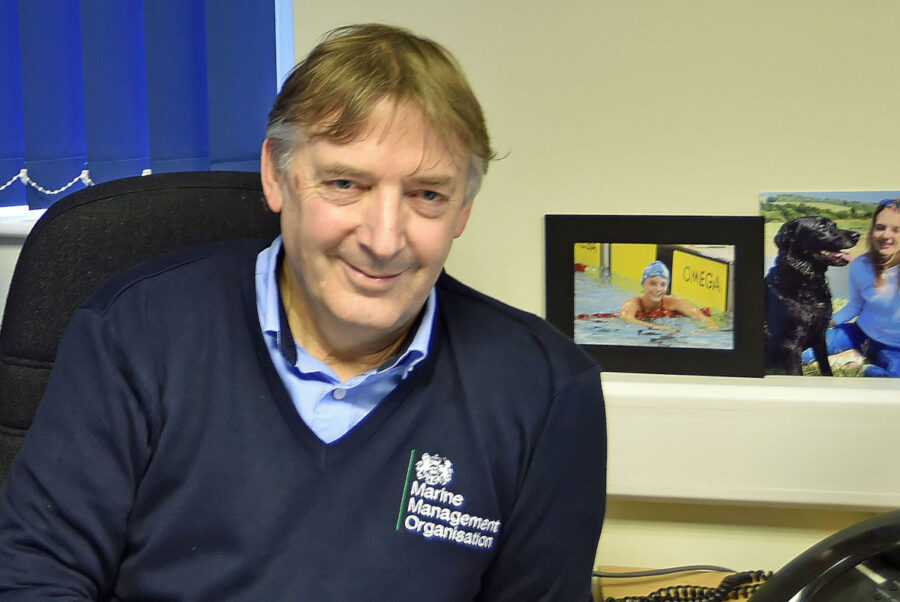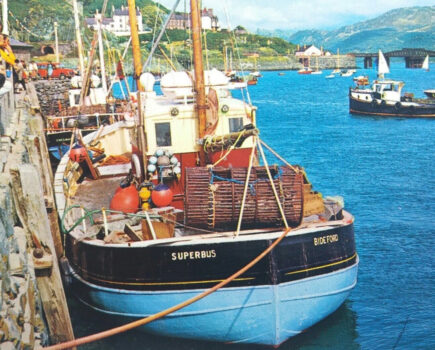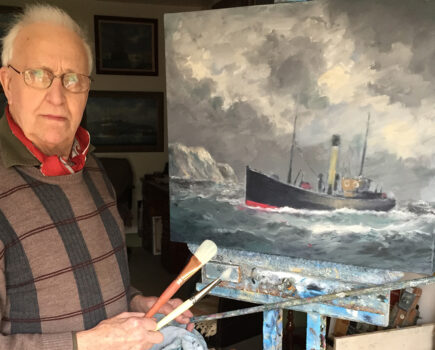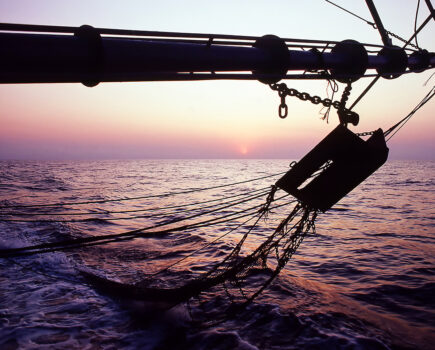The Marine Management Organisation (MMO) has had to adapt its way of working, but communication remains key, reports John Periam
Paul Johnson, the MMO’s principal officer for the South East, has been with the regional team in Sussex since 1993, where he started as a fishery officer and worked his way through the ranks until he was made principal officer in 2008. The area he covers is from Lymington in Hampshire to Gravesend in Kent, with regional offices in Shoreham, Hastings and Portsmouth.
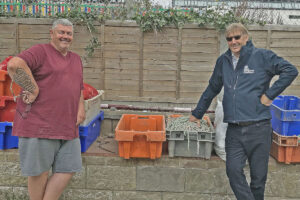
Andy Gillam, a Sussex net-maker who supplies many of the region’s fishermen, meets Paul Johnson – at an appropriate social distance.
The regional team have developed an excellent working relationship with all parties in maintaining a sustainable fishing industry in the South East, but since the onset of the coronavirus crisis, their working role has had to be revised to comply with government legislation. Paul said: “It has been a really challenging period for both the fishing industry and ourselves. The main thrust from the MMO has been to maintain a supportive relationship with the industry. Our offices have been closed, so we have been working from home, and it has been very busy, particularly in meeting the needs of the Fisheries Response Fund (FRF) and direct selling.
“A positive communications network has been set up linking all the offices and officers’ support from our Newcastle headquarters. This has been an asset to us, giving us the opportunity to continue as best as we can.
“We quickly introduced a temporary electronic licensing system so fishermen can still have access to licences so their businesses can continue. These licences are temporary, and if we eventually get back to normal, transfers can be made to the proper in-house system.”
During the lockdown, direct inspections ceased. As time progressed, the team restarted what they call observational patrols – they were seen, but at this stage there was no direct intervention. Paul said: “We were there on an assurance rather than an enforcement basis, using our cars as our offices when on the road. This was a new type of involvement which we had to come to terms with. Obviously we had to support the finance teams, who rolled out the FRF funding supporting fishermen with their standing costs. Several of our officers working alongside the finance team contributed to this. As a result, we managed to get many of the finance packages out in record time.
“Once this was done, the officers returned to their normal roles of cross-checking catch documentation. At the same time, we were planning for the restart of inspections. We will be on the quayside again, but they will be a different type of inspection, involving social distancing, but still providing assurance and support.”
The MMO’s work with other organisations continued, including the Inshore Fisheries and Conservation Authorities (IFCAs) and the NFFO. On the French side of the Channel, the MMO’s counterparts are in regular touch now that the markets are opening again. “It is important to see that prices are stable, which they currently appear to be, alongside fish being transported there. All seems to be going well,” said Paul.
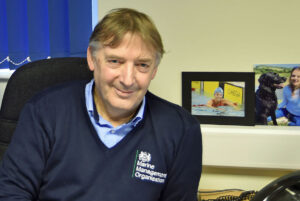
Paul Johnson, the MMO’s principal officer in the South East, in his Shoreham office.
“Regarding direct selling by fishermen, the MMO has been seeing more. However, what is of the utmost importance is that all the catches are reported correctly. We must know what is coming out of the water, and that it is traceable. There is still a strong need for our fish merchants to be at the hub of fish sales. They really do support the industry, particularly with regard to those very valuable species of fish that we export, including cuttlefish and whelks, which are going to take a lot of encouragement to cook at home across the UK. We need those merchants to ensure that we have the ability to move and sell fish for the industry, and ensure liquidity in the movement of fish in the UK industry.” The MMO is looking to help the industry achieve the right balance. There is room for both selling direct and via established markets.
The MMO’s officers are now establishing a ‘new normal’, with safe working practices in place. Paul said: “We are now on restart, and have been issued with personal protective equipment and very comprehensive health and safety guides. We have been testing it here in the South East, and have had a very good response from all parties. They have been respectful of social distancing, and have understood what we want to do and why we need to do it. It is not the fishermen who cause us issues – it is often the public on the quayside who don’t respect the social distancing.”
Communication with fishermen is central to the MMO’s work. “I have a lot of interaction with the industry,” said Paul. “Communication is what it is all about, and I cannot stress this enough. I get many phone calls asking questions, and I try to be available as often as possible, taking account of the working hours of the industry.
“At the start of lockdown, there was a real nervousness in the industry, and many were not sure how things were going to go. Top of the list then was the closure of the markets in France and Belgium. As that eased and fishermen found new ways of working, things started to get better for them. Many work single-handed and take their worries home with them. They have their frustrations, but seem to be managing the situation quite well – I only speak for this area.”
Concerns are still being raised about large foreign vessels working in our waters. Paul said: “We are now starting our boardings at sea again, which we had to stop during lockdown. Our vessel Ocean Osprey, which is contracted to us, will be seen operating around the UK again. I do appreciate there are frustrations at sea in this area at the moment, and we are looking at ways of managing the situation. Of course, we are there to assure and protect the UK fishing industry, and ensure sustainable practices at sea are carried out by all working in our waters.”
It is often not easy for those who work in government departments, and many criticisms are made about those who work within them – fairly or unfairly. What comes across in the South East is the respect that Paul and his MMO officers have gained within the community. He said: “I don’t find any difficulties in meeting face to face with fishermen, although it is something that has not occurred much recently! However, it is very much part of my remit, and if people want to talk to me, that is what I am happy to do. I have missed my visits to Rye and enjoying one of Ronnie Simmons’ cappuccinos of late – hopefully he will restock his cupboard after this is all over!
“We can help each other and provide assurance in time of need. Sustainability through regulation is here, and we have to live with that. We can only learn from each other, and there are some excellent people out there who have positive ideas in wanting to make this industry work. Tony Delahunty, who is on the MMO board and once fished out of Selsey, is a real support – he has local knowledge and contacts who are happy to support what we do.
“Many fishermen come from a close-knit fishing community and share things with each other. However, they are proud and will do anything to protect what they feel is rightly theirs. We can all learn from each other, and they are part of the infrastructure that drives this industry on a daily basis.”
How does Paul Johnson see the future? “I have not seen a decline in working fishermen locally – indeed, I have seen some welcome investment. I have seen some weariness and concern at times, but not enough for people to hang up their nets. Looking through a periscope, there is a slightly blurred lens at the end, and we will have to see what happens next year. Many are doing just that, and continuing their work with some optimism.
“There are reports of some youngsters looking at what fishing has to offer, to see if there could be fresh opportunities for them in the industry – which is great to see. Some fishermen out there want to encourage this, and offer support to those who want to have a go. Rules and regulations are there to ensure sustainability for future generations, and I hope the MMO is providing the level of assurance that is required for the years to come.”

